Jury Rights Day
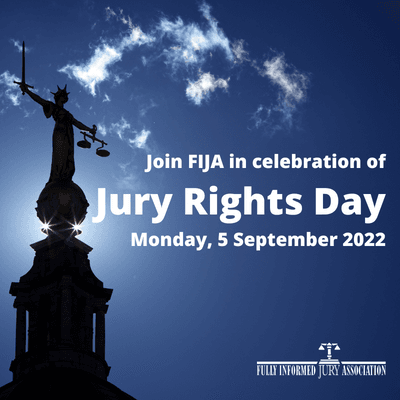
FIJA has celebrated Jury Rights Day on September 5 each year for more than 30 years to commemorate the famous case of William Penn in 1670 which laid the foundation for the right that jurors have still today to conscientiously acquit someone by jury nullification. 2022 marks the 352nd anniversary of this famous case, which helped establish freedoms of religion, speech, and assembly in United States culture and law.
Jump to:
Celebrate Jury Rights Day
Please join us this year in celebrating Jury Rights Day!
This year, Jury Rights Day falls on Labor Day. We have a number of suggestions for how and when you can celebrate on Jury Rights Day proper or on an alternate day when courts are open.
Courthouse Outreach
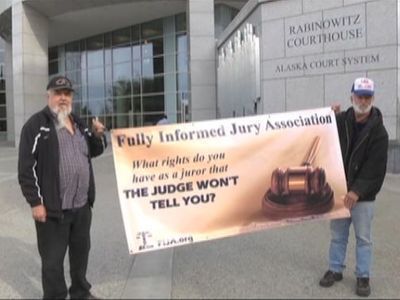
Juror Rights Educators Celebrate Jury Rights Day at Rabinowitz Courthouse in Fairbanks, Alaska
Traditionally, we ask people to celebrate Jury Rights Day by spending an hour sharing FIJA literature outside their local courthouse. This year Jury Rights Day falls on Labor Day, but you can still celebrate with courthouse outreach! We recommend selecting a day either the week before or after Jury Rights Day to hold your event.
Gather a few friends and we'll supply materials for free. These will be specifically for Jury Rights Day events—we are a tiny non-profit with a very limited budget, so unfortunately we can't just ship out free materials for folks to hang onto "just in case" something comes up.
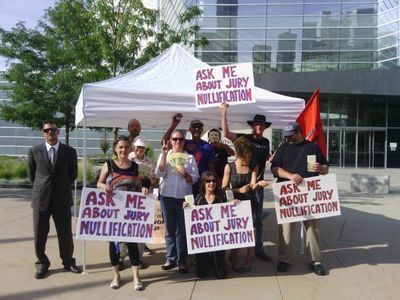
Juror Rights Educators Doing Courthouse Outreach at Lindsey-Flanigan Courthouse in Denver, Colorado
Click here to register your event and get a free Jury Rights Day event kit.
Hold a Sign Wave
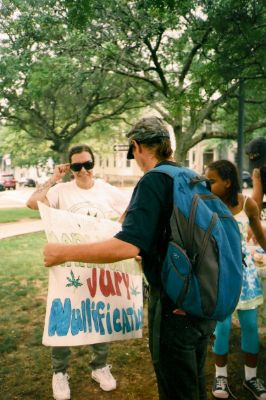
Because Jury Rights Day falls on a day when no business is generally being held at the courthouse, you may want to go a little more high profile with your celebration. An easy way to do this would be to gather a few friends and hold a Jury Rights Day sign wave.
Make some homemade signs using poster board, recycled cardboard, paints, markers, or whatever you have on hand. Create some some fun slogans, write them on your signs in large lettering, and add some simple graphics. Include the URLs FIJA.org and JuryRightsDay.org on some of the signs to direct people to this website for more information. Some of your signs can ask drivers to honk to support jury rights to help draw more attention to your outreach.
Be sure to make the size of any words
BIG!
Bigger than you think, probably. Remember, people will need to read these from a distance and often while they are moving quickly.
Find a location on the public sidewalk that a lot of traffic will pass by as you hold up your signs. If you can find a busy intersection and position one or two people on each corner, that's a great way to make sure people from all directions can see you. You can also stand on one or both sides of a major thoroughfare where traffic will be flowing.
Sharing this information for just an hour or two in a busy area can pique many people's interest to visit FIJA online where they can become fully informed jurors!
Host a Movie Night or Filmfest
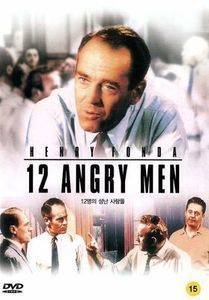
Hosting a movie night or filmfest is a great way to celebrate Jury Rights Day. Gather up family and friends in your living room or online. Then watch one or more of our recommended films together and use it as a springboard for conversation about the importance of reclaiming our jury rights.
Whether you enjoy classics, dramas, documentaries, or foreign films, we have some great selections we recommend.
Click here to see our list of recommended films for Jury Rights Day.
Submit an Op-Ed or Letter to the Editor
If you are seeing this on or around when this webpage was published, it is several weeks until Jury Rights Day. That gives you PLENTY of time to write an opinion piece and submit it to your local newspapers to help create more fully informed jurors right where you live!
Whether you are writing an op-ed or letter to the editor (LTE), your first move is to look up the paper you want to submit to online and find their submission guidelines. You can often find these online either by doing a web search for the name of the paper followed by "op-ed submission guidelines" or "letter to the editor submission guidelines". If you're on the paper's website, we recommend checking the Opinion section first for guidelines and then the Contact section if you don't find them there. Click here for an example of op-ed submission guidelines. Click here for an example of guidelines on how to submit your LTE.
Follow the instructions for length of the op-ed or letter, how to submit it, and any other instructions for best chance of getting published. If you can refer to a specific news item in the paper in your piece, it is a good idea to do so. Be prepared to back up any factual assertions with a credible reference if requested.
Do not wait until the last minute! Opinion pieces selected to run in the Sunday edition may be accepted well in advance. Even if yours isn't slated for a Sunday edition, it may take a few days for the editor to review your piece and get back to you before putting it in a weekday edition. Additionally, many outlets want exclusive access to publish your piece, so you want to leave time to submit it to another outlet if it is not accepted by the first.
Resources for writing and submitting op-eds:
- Op-ed Writing: Tips and Tricks from The OpEd Project
- Writing Effective Op-Eds from Duke University's Communicator Toolkit
- Write an Op-Ed, Get Published, and Land on the News from The Leadership Institute
- How to Place an Op-Ed in Your Local Newspaper from MoveOn
- Op-Eds and Letters to the Editor (.pdf) from the National Association of Criminal Defense Lawyers
Resources for writing letters to the editor:
- Writing a letter to the editor (LTE) of your local paper (.pdf) from Families Against Mandatory Minimums
- Letters to the Editor: How to Write Them and Why They Work from the ACLU
- How to Write a Letter to the Editor that Gets Published and Read from Getting Attention
March in a Labor Day Parade
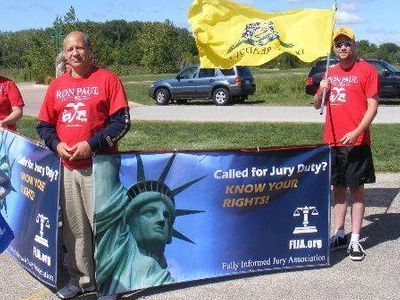
Did you know that one of the key cases in the history of jury nullification is also related to the labor movement in the United States? In Sparf and Hansen v. United States (1895), the judge in the case not only invaded the jury's role as fact finder, but also undermined their role in judging the law by misinforming them about their right of jury nullification. But, said former Washington State Supreme Court Justice William Goodloe, we should not forget the historical context in which that took place.
"The 1890s were a time of strife between labor and industry. Most judges came from the upper classes and they often sided with the wealthy owners of industry by using their injunction powers to break labor strikes. The juries, on the other hand, were often working class people and they often used jury nullification to defeat anti-labor union laws by acquitting striking workers and labor union organizers who were being tried under criminal conspiracy laws that had been enacted to stop unions. Juries acquitted in spite of evidence the labor union organizers were "guilty" of the "crime" of organizing a labor union.
The majority opinion in Sparf and Hansen in 1895 attempted to curb the jury's knowledge of the right of jury nullification. The Court could hardly have been unaware that this opinion would help wealth industrialists and harm the labor movement."
Reference: "Jury Nullification: Empowering the Jury as the Fourth Branch of Government," by former Washington State Supreme Court Justice William Goodloe, 1996.
Participating in a local labor day parade is a great opportunity to help your community make this connection.
Host an Information Table
What's going on in your community over Labor Day weekend? Whether it is a county fair, farmers market, hempfest, gun show, music festival, arts and crafts fair, or something else, it's worth checking out whether they will let you host and information table or booth. Often the fee is very small or is waived entirely for those promoting the mission of a nonprofit organization.
Once you are signed up for the event, gather a few friends to take shifts hosting it and request a table kit from FIJA.
FIJA provides:
- a green tablecloth,
- a table runner with the FIJA logo on it,
- an assortment of brochures,
- upright brochure holders,
- sample copies of our essays for people to browse at the table,
- and we ship the kit to you at our expense.
You are responsible for:
- returning the tablecloth, table runner, brochure holders, sample essays, and any brochures that were not distributed at the event,
- covering the cost of return shipping and sending them back to FIJA within a week after the conclusion of the event, and
- emailing 4 high resolution photos of the tabling event for use by FIJA in our social media outreach, on our website, in print publications, etc. within a week after the conclusion of the event.
Invite a Speaker to Present to Your Group

On or near Jury Rights Day is a great time to invite a FIJA speaker to give an educational presentation to your community group to create more fully informed jurors. We have a number of experienced speakers who can be called upon to give a presentation either in person or via remote technology.
Most speakers have a number of prepared talks they can give that can be tailored to meet your group's needs. If you don't see a talk along the lines of what you are looking for, please don't hesitate to let us know what you need. We can usually customize presentations for your group on other jury-related topics with reasonable advance notice.
If you are not prepared to host an online presentation, don't worry. We can usually do that for you if you let us know you will need help with that. In that case, we will:
- schedule a Zoom meeting for the agreed upon time and date,
- provide you a link to share with your group so that they can register,
- send a reminder notice to all those registered on the day of the event, and
- deal with all the technical aspects of running the meeting on the day of the event.
Share on Social Media
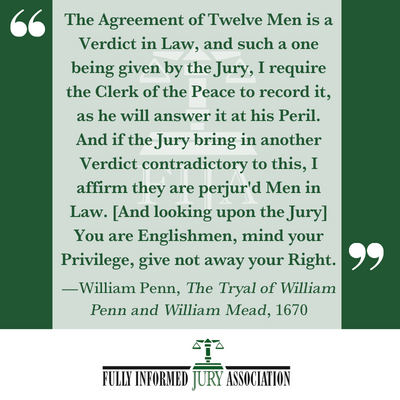
Don't forget to let people know about Jury Rights Day not only on the day itself, but in the days and weeks leading up to it!
Some great hashtags to use in posts directing people to this Jury Rights Day page or the FIJA home page include #JuryRightsDay, #jurynullification, and #FIJA. If you'd like to share some particularly relevant quotes on social media, we have several select quotes available in text for copying and pasting or in graphic formats sized for Twitter, Facebook, and other social media that you can download and share around.
Click here for a selection of quotes in various formats from the Trial of William Penn and William Mead.
History of Jury Rights Day
In 1670, William Penn of London was arrested for publicly preaching the Quaker religion at a time when England’s Conventicle Act outlawed the public practice of religions other than the Church of England.
Though he had probably technically broken the law, Penn pled Not Guilty. Penn and Mead attempted to plead their innocence in a lively trial in which both of them ultimately were removed from the presence of the jurors by order of an outraged judge who was looking for easy convictions.
Such convictions were not forthcoming. The court repeatedly demanded that the jurors find Penn guilty, rejecting any other verdict and sending them back to deliberate again and again. When these attempts proved insufficient, the court attempted to coerce jurors to convict Penn by jailing the noncompliant jurors in England's notorious Newgate prison. The court withheld from them food and water, tobacco, fire, and even so much as a chamber pot.
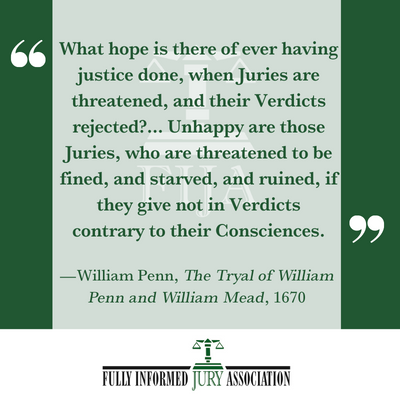
Despite this abuse, some of the jurors refused to comply. Eventually the court accepted their not guilty verdicts for both Penn and Meade, but then fined them forty marks each in punishment and sentenced them to confinement once again in Newgate prison until their fines were paid. Jury Rights Day commemorates this famous jury nullification trial, which concluded on 5 September 1670.
Some of the jurors appealed the fines and imprisonment. In this appeal, known as Bushel’s case after the jury foreman Edward Bushel, the higher court ruling confirmed that jurors cannot be punished for their not guilty verdicts, even if a law has technically been broken. Penn’s and Bushel’s cases not only firmly established our jury rights in the common law tradition, but also laid a foundation for freedom of religion, freedom of speech, and freedom of assembly that we hold dear still today.
Jurors’ refusal to enforce unjust or unjustly applied laws is known as jury nullification, jury veto, conscientious acquittal, and other terms. It is a crucial tool that citizens have to restrain government. Your authority as a juror gives you the opportunity to stop corrupt and malicious government officials from violating your neighbors' rights, and in doing so, you protect your own rights as well.
Related Resources
- The Trial of William Penn and William Mead at the Old Bailey, 1670 (.pdf)—the account of the trial as told by William Penn and William Mead afterward

